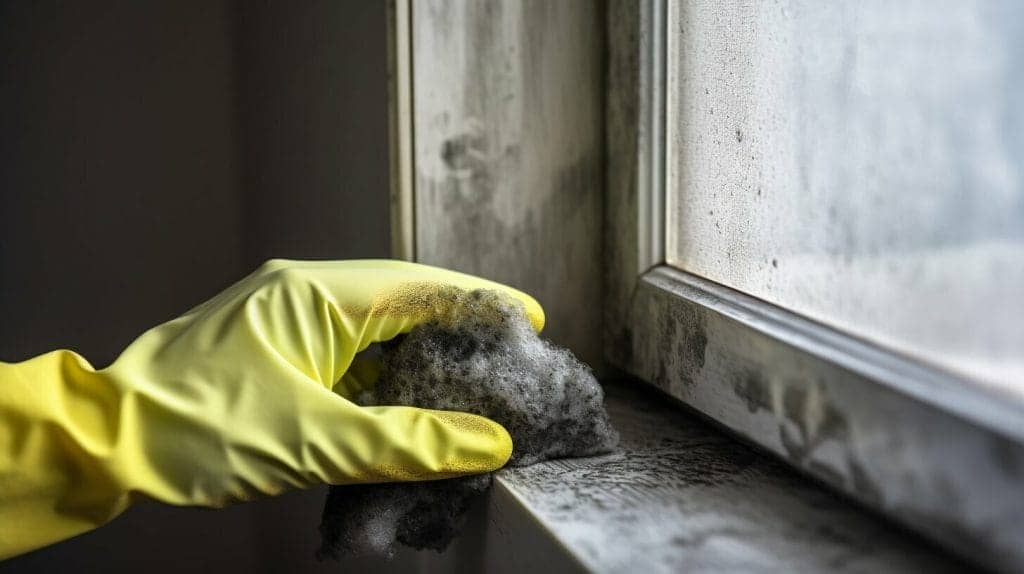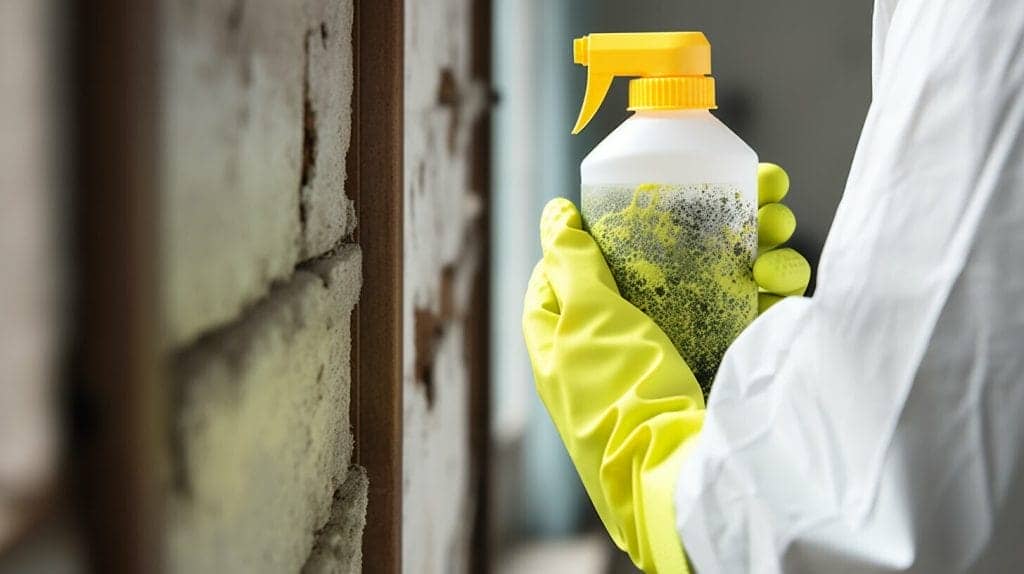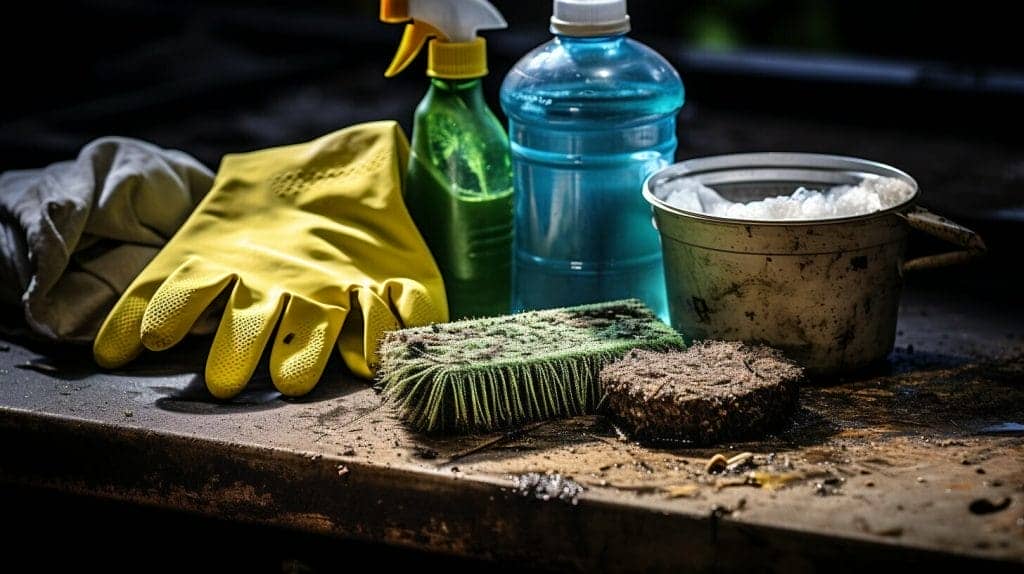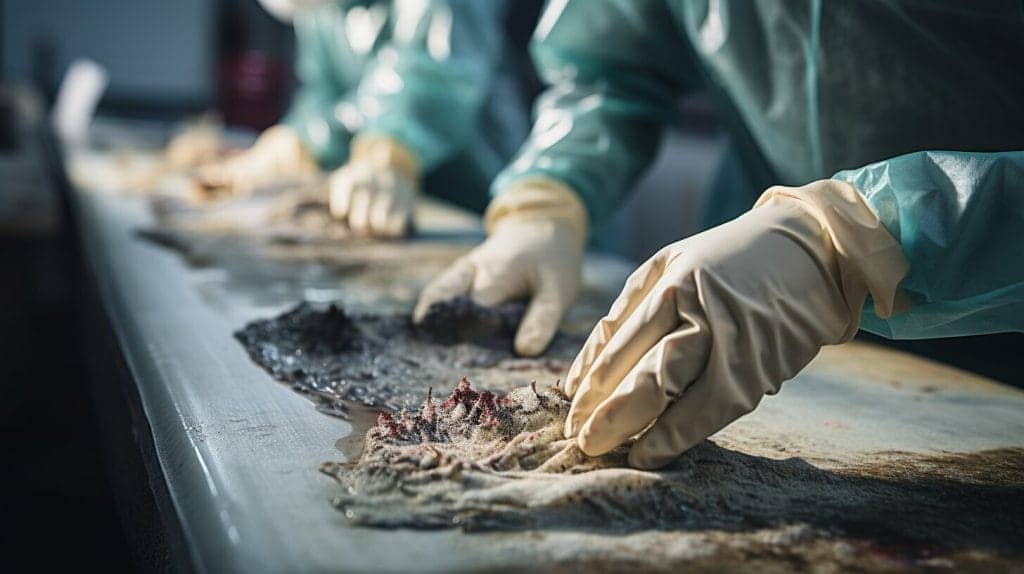Mold exposure poses significant health risks, including the potential for mold-induced immunosuppression. This condition can have a negative impact on the immune system, making individuals more vulnerable to illness and disease. Seeking medical support for mold-related health issues is crucial to managing and treating these concerns.
In this comprehensive guide, readers will learn about the mechanisms of mold-induced immunosuppression, the symptoms of mold-related illness, and the diagnostic and treatment options available. This guide also provides practical advice on lifestyle changes that support immune health and strategies for maintaining a mold-free environment to prevent future health problems.
Key Takeaways:
- Mold exposure can lead to mold-induced immunosuppression, compromising the immune system and increasing the risk of illness.
- Medical support is essential for managing and treating mold-related health issues.
- Lifestyle changes and mold prevention strategies can also support immune health and prevent future health problems.
Understanding Mold-Induced Immunosuppression
Mold-induced immunosuppression occurs when exposure to mold and mold spores negatively impacts the immune system, compromising immune function and increasing the risk of illness. The immune system plays a crucial role in protecting the body against pathogens, but when exposed to mold, it can become overwhelmed and unable to mount an effective response. This can lead to immune dysfunction and a range of health problems.
Mold exposure can cause immunosuppression through several mechanisms. One way is by directly damaging immune cells, such as T-cells and macrophages. Another way is by releasing mycotoxins, which are harmful substances produced by certain types of mold. Mycotoxins can disrupt immune function and cause inflammation in the body, further compromising immune health.
Immunosuppression caused by mold exposure can manifest in various ways, including increased susceptibility to infections, chronic fatigue, allergies, and asthma. Other symptoms may include skin rashes, headaches, and respiratory problems. The severity of symptoms can vary depending on the individual’s level of exposure and immune system health.
It is crucial to understand the mechanisms of mold-induced immune dysfunction to take appropriate action in preventing and treating mold-related health issues. Seeking medical support can help individuals develop a comprehensive treatment plan that addresses the root cause of the problem and supports immune function.
Recognizing Symptoms of Mold-Related Illness
Mold-induced immunosuppression can cause a variety of symptoms that may mimic those of other illnesses. As a result, it can be difficult to diagnose and treat without proper medical attention. Some of the most common symptoms of mold-related illness include:
- Fatigue and weakness
- Headaches
- Breathing difficulties
- Allergic reactions, such as sneezing, coughing, and skin rashes
- Eye irritation and watering
- Difficulty concentrating or remembering
If you suspect that you may be experiencing symptoms of mold-related illness, it is important to seek medical attention as soon as possible. A healthcare professional experienced in managing mold-related health issues can help diagnose and manage your symptoms effectively, reducing the risk of complications and improving your overall quality of life.
Managing mold-related health issues may involve a combination of treatments, including medications, lifestyle modifications, and targeted therapies. Your healthcare provider can work with you to develop a personalized treatment plan that addresses your specific needs and supports your immune health over the long term.
Understanding Mold Toxicity
Mold toxicity, also known as mycotoxicosis, refers to the negative effects of exposure to mold on the human body, particularly the immune system. When mold spores are inhaled or ingested, they can produce toxic substances called mycotoxins that can cause a range of health problems.
One of the most concerning effects of mold toxicity is its impact on the immune system, which can lead to immunosuppression or immune dysfunction. This can make individuals more susceptible to infections and illnesses, as the immune system is unable to mount an effective defense against harmful pathogens.
Additionally, mold toxicity can cause inflammation throughout the body, which can further compromise immune function and lead to chronic health conditions.
The treatment of mold-induced immunosuppression requires targeted intervention to address the underlying cause of the immune dysfunction. Traditional treatment options may include medications, therapies such as allergy shots and immunotherapy, and lifestyle modifications to reduce exposure to mold.
However, integrative medicine approaches such as those offered at Oasis Medical Institute have been shown to provide more comprehensive and effective treatment for mold toxicity and immune dysfunction. These approaches combine conventional medical treatments with complementary therapies such as nutrition counseling, acupuncture, and herbal medicine to support overall health and immune function.
It is crucial for those experiencing symptoms of mold-related illness to seek medical support and identify the root cause of their health issues. With proper diagnosis and treatment, individuals can overcome the negative effects of mold toxicity on their immune system and achieve optimal health.
Holistic Treatment Options at Oasis Medical Institute
Oasis Medical Institute in Tijuana, MX, offers comprehensive holistic treatment options for individuals struggling with mold-induced immunosuppression. Dr. Francisco Contreras MD, a renowned integrative medicine specialist, leads the team in providing personalized, evidence-based care to patients seeking relief from mold-related health issues.
At Oasis Medical Institute, the treatment approach to mold toxicity is based on a combination of conventional medicine and holistic therapies. During an initial consultation, a personalized treatment plan is created for each patient, taking into account their unique medical history, symptoms, and lifestyle factors.
The holistic treatment options offered at Oasis Medical Institute may include:
- Detoxification therapies: These therapies are designed to help rid the body of toxins that have accumulated due to mold exposure, including intravenous vitamin C therapy, ozone therapy, and colon hydrotherapy.
- Nutritional support: A nutrient-rich diet and targeted supplements may be recommended to support the immune system and help combat the effects of mold toxicity.
- Mind-body therapies: Stress reduction techniques such as meditation and yoga can be helpful in managing the emotional toll of chronic illness and supporting overall well-being.
- Homeopathy: This branch of medicine uses highly diluted natural substances to stimulate the body’s healing response and alleviate symptoms of mold toxicity.
- Hyperthermia therapy: This treatment involves using heat to elevate body temperature and activate the immune system to fight infection and inflammation.
Patients receive ongoing medical support throughout their treatment program, with regular check-ins and adjustments to their treatment plan as needed. With a focus on the whole person and a dedication to evidence-based, integrative medicine, Oasis Medical Institute provides a unique and effective approach to addressing mold-induced immunosuppression.
Mold-Related Health Risks and Prevention Strategies
Exposure to mold can pose significant health risks, including allergic reactions, respiratory problems, and even neurological symptoms. Individuals who are immunocompromised, such as those with weakened immune systems, are particularly susceptible to the negative effects of mold exposure. To prevent mold-related health problems, it’s crucial to take proactive measures to limit exposure and maintain a clean, mold-free environment.
One of the most effective ways to prevent mold growth is by controlling humidity levels in the home. Ideally, indoor humidity should be kept between 30-60% to prevent mold from growing. Using dehumidifiers, proper ventilation, and fixing leaks promptly can help control moisture levels and prevent mold from developing. It’s also important to address any visible mold growth immediately and to clean and dry affected areas thoroughly.
In addition to limiting exposure, maintaining good overall health can also reduce the risk of mold-related health problems. Regular exercise, a balanced diet, and stress management techniques can help support immune function and reduce inflammation, which can make individuals less susceptible to the negative effects of mold exposure.
Finally, being proactive about monitoring for any signs of mold-related health problems can help prevent complications and ensure prompt treatment. Symptoms such as coughing, wheezing, sneezing, and skin irritation should be evaluated by a healthcare professional, particularly for those who are immunocompromised. Regular medical check-ups can help detect any early signs of mold-related health issues and allow for timely intervention.
Diagnostic Approaches for Mold-Induced Immunosuppression
Medical professionals use various diagnostic approaches to identify mold-induced immunosuppression. These approaches may include:
- Medical History: The doctor will ask questions about the patient’s symptoms, medical history, and exposure to mold. An accurate medical history may provide significant clues to the underlying cause of the symptoms.
- Physical Examination: The doctor will conduct a physical exam to assess the patient’s overall health and identify any physical signs of mold-related illness, such as skin irritation and respiratory distress.
- Blood Tests: Blood tests can detect the presence of antibodies to mold in the bloodstream, indicating exposure to mold and potential immune system involvement. Blood tests can also identify changes in white blood cells that may indicate immune dysfunction caused by mold exposure.
- Imaging Tests: Imaging tests, such as chest X-rays and CT scans, can help identify mold-related lung problems and other physical abnormalities that may be contributing to the patient’s symptoms.
- Biopsy: In rare cases, a biopsy may be necessary to confirm the diagnosis of mold-induced immunosuppression. The doctor will remove a small tissue sample from the affected area for laboratory analysis, which can help identify the type of mold present and the extent of tissue damage.
It is important to note that mold-related illness can mimic other conditions, and a definitive diagnosis may be challenging to obtain. However, with a comprehensive medical evaluation and testing, healthcare professionals can identify and target mold-induced immunosuppression, enabling patients to receive appropriate treatment and manage their symptoms effectively.
Managing mold-related health issues requires diligent medical monitoring and ongoing support. Seek medical support promptly if you suspect that you or someone you know is experiencing mold-related health problems. With proper medical care, it is possible to minimize the impact of mold-induced immunosuppression on overall health and well-being.
Traditional Treatment Options for Mold-Induced Immunosuppression
The traditional treatment options for mold-induced immunosuppression focus on relieving symptoms and supporting the immune system to prevent further health complications.
In some cases, medications such as antihistamines, decongestants, and corticosteroids may be prescribed to manage symptoms such as nasal congestion, cough, and wheezing. These drugs work by reducing inflammation in the airways and improving breathing.
Therapies such as immunotherapy and allergy shots may also be recommended to reduce sensitivity to mold allergens. These treatments involve injecting small amounts of allergens into the body over time to desensitize the immune system and reduce allergic reactions.
Lifestyle modifications, such as avoiding exposure to mold and other allergens, maintaining a healthy diet, getting regular exercise, and reducing stress, can also be beneficial in managing mold-induced immunosuppression.
It’s important to work closely with a healthcare provider to develop an individualized treatment plan that addresses specific symptoms and underlying health conditions. Regular monitoring of immune function, lung function, and overall health is also essential to ensure that treatment strategies are effective and adjusted as needed.
Integrative Medicine for Mold Toxicity at Oasis Medical Institute
At Oasis Medical Institute, patients have access to a range of holistic treatments that address mold-induced immunosuppression. Dr. Francisco Contreras MD and his team of healthcare professionals combine conventional medicine with complementary therapies to help patients achieve optimal health.
One of the primary treatments used at Oasis Medical Institute is bio-oxidative therapy, which involves the infusion of oxygen and ozone to help remove toxins from the body and improve immune function. This therapy can be complemented by a range of other holistic treatments, including:
- Nutritional counseling
- Vitamin and mineral supplementation
- Aromatherapy
- Massage therapy
- Mind-body therapies such as meditation and yoga
By taking an integrative approach to mold-induced immunosuppression, Oasis Medical Institute aims to provide patients with a comprehensive treatment plan that supports immune health and restores overall wellbeing.
Lifestyle Changes to Support Immune Health
Managing mold-related health issues often involves implementing lifestyle changes to support immune function. While medical treatments can alleviate symptoms and address underlying immune dysfunction, the following lifestyle changes can help prevent mold-related health problems:
- Nutrition: Consuming a well-balanced diet rich in fruits, vegetables, and lean protein sources can provide essential nutrients for immune function. Avoiding processed foods and excess sugar can also reduce inflammation in the body.
- Exercise: Regular physical activity can enhance immune function by promoting circulation, reducing stress, and improving respiratory health. Aim for at least 30 minutes of moderate exercise per day.
- Stress Management: Chronic stress can weaken immune function and exacerbate mold-related symptoms. Practicing stress reduction techniques such as deep breathing, meditation, or yoga can help reduce stress levels.
- Sleep Hygiene: Getting adequate restful sleep is crucial for immune function. Avoiding electronic devices before bedtime, creating a relaxing sleep environment, and sticking to a consistent sleep schedule can promote quality sleep.
Implementing these lifestyle changes can help support immune function and reduce the risk of mold-related health problems. Working with a healthcare professional experienced in treating mold-induced immunosuppression can provide guidance on implementing these changes and monitoring progress.
Maintaining a Mold-Free Environment
Preventing mold exposure is key to reducing the risk of mold-related health problems. Individuals can take steps to maintain a mold-free environment in their homes and workplaces.
Identifying and addressing sources of moisture is critical in preventing mold growth. Inspect areas prone to water damage, such as the bathroom, basement, and kitchen, for any signs of dampness or leaks. Address any issues promptly, such as repairing leaky pipes or improving ventilation in high moisture areas.
Controlling humidity levels is also important in preventing mold growth. Use a dehumidifier in areas with high humidity, such as the basement or laundry room. Aim for a relative humidity level of 30-50% to prevent mold growth.
Cleaning and disinfecting regularly can also help prevent mold growth. Use a mold-killing cleaner to clean surfaces prone to mold growth, such as the shower or kitchen sink. Clean up any spills or water damage immediately to prevent mold growth.
Proper ventilation is essential in maintaining a mold-free environment. Use exhaust fans in high moisture areas, such as the bathroom and kitchen, to improve ventilation. Open windows to increase air flow and reduce humidity levels.
In summary, maintaining a mold-free environment is crucial in preventing mold-related health problems. Individuals can take steps to prevent mold growth by addressing sources of moisture, controlling humidity levels, cleaning regularly, and improving ventilation.
Importance of Regular Medical Monitoring
Individuals with mold-induced immunosuppression require ongoing medical support to manage their symptoms and maintain optimal immune function. Regular medical monitoring is essential for identifying changes in health status, detecting potential complications, and adjusting treatment plans as needed.
Mold-related health issues can be complex and may require a multi-disciplinary approach. A healthcare team that includes specialists in immunology, environmental medicine, and integrative medicine can provide the most comprehensive care for individuals with mold-induced immunosuppression.
Medical monitoring may include regular check-ups with a primary care physician, as well as consultations with specialists as needed. Lab tests, imaging studies, and other diagnostic evaluations may be recommended to assess immune function and monitor for complications such as infections.
Through regular medical monitoring, individuals with mold-induced immunosuppression can receive ongoing support for managing their symptoms and optimizing their immune function. With appropriate medical care, it is possible to live a healthy and fulfilling life while managing mold-related health issues.
Seeking Medical Support for Mold-Induced Immunosuppression
For individuals experiencing symptoms of mold-induced immunosuppression, seeking medical support is crucial. It is important to find healthcare professionals who are experienced in treating mold-related health issues and are knowledgeable about the link between mold and immune function.
When seeking medical support for mold-induced immunosuppression, patients should be prepared to provide a detailed medical history, including any past exposure to mold. Medical professionals may use various diagnostic approaches to assess immune function and identify any underlying health issues related to mold exposure.
The treatment for mold-induced immunosuppression may involve lifestyle modifications, such as improving nutrition, reducing stress, and increasing exercise. It may also involve traditional medical treatments, such as medications, therapies, and surgeries to manage symptoms and address underlying health issues.
For those seeking a more holistic approach to treatment, Oasis Medical Institute offers a comprehensive program for managing mold-induced immunosuppression. This program combines conventional medical treatments with holistic therapies, such as acupuncture, herbal remedies, and nutritional counseling, to address the root causes of mold toxicity and promote overall immune health.
Ultimately, seeking medical support for mold-induced immunosuppression is crucial for managing symptoms, preventing complications, and restoring optimal immune function. Patients are encouraged to do their research and find healthcare professionals who are knowledgeable and experienced in treating this condition.
Conclusion
Mold-induced immunosuppression can have a significant impact on overall health, making it crucial to seek medical support for managing any mold-related health issues. This guide has provided a comprehensive overview of the mechanisms and risks of mold exposure, along with strategies for prevention and treatment.
It is important to recognize the symptoms of mold-related illness and seek proper diagnosis and treatment from qualified medical professionals. Traditional treatment options are available, but an integrative approach that combines conventional medicine with holistic therapies can offer a more targeted and effective solution.
Lifestyle changes, such as improving nutrition, reducing stress, and getting adequate sleep and exercise, can also support immune health and reduce the risk of mold-related health problems. Additionally, maintaining a mold-free environment in homes and workplaces can prevent exposure to harmful toxins.
Regular medical monitoring is essential for individuals with mold-induced immunosuppression, as it can help manage symptoms and ensure optimal immune function. By taking proactive steps towards protecting their immune system and overall health, individuals can reduce the impact of mold-related health issues on their lives.
Take action today to manage mold-related health issues and treat mold-induced immunosuppression. Seek medical support from qualified practitioners and make lifestyle changes to support your immune health.
FAQ
Q: What is mold-induced immunosuppression?
A: Mold-induced immunosuppression refers to the weakening of the immune system as a result of exposure to mold. Mold can release spores and toxins that can negatively impact immune function, making individuals more susceptible to infections and other health issues.
Q: What are the symptoms of mold-related illness?
A: Symptoms of mold-related illness can vary but commonly include respiratory problems, such as coughing and wheezing, as well as nasal congestion, skin rashes, headaches, fatigue, and difficulty concentrating.
Q: How can mold-induced immunosuppression be diagnosed?
A: Medical professionals may use various diagnostic approaches to identify mold-induced immunosuppression, including blood tests, allergy tests, and evaluations of symptoms and medical history. These tests help determine the impact of mold exposure on the immune system and overall health.
Q: What are the traditional treatment options for mold-induced immunosuppression?
A: Traditional treatment options for mold-induced immunosuppression may involve the use of medications to manage symptoms, therapies to support immune function, and lifestyle modifications such as avoiding mold exposure and maintaining a healthy diet and exercise routine.
Q: What holistic treatment options are available for mold-induced immunosuppression at Oasis Medical Institute?
A: Oasis Medical Institute offers a holistic approach to treating mold-induced immunosuppression. This may include a combination of conventional medicine and holistic therapies, such as nutritional support, detoxification, intravenous therapies, and lifestyle counseling.
Q: How can I prevent mold-related health problems?
A: Preventing mold-related health problems involves maintaining a clean and mold-free environment. This includes identifying and addressing sources of mold, ensuring proper ventilation and humidity control, and practicing good hygiene and cleaning habits.
Q: Why is regular medical monitoring important for mold-induced immunosuppression?
A: Regular medical monitoring is important for individuals with mold-induced immunosuppression to manage symptoms, prevent complications, and ensure optimal immune function. It allows healthcare professionals to monitor progress, adjust treatment plans if necessary, and provide ongoing support.
Q: How can I find healthcare professionals experienced in treating mold-related health issues?
A: To find healthcare professionals experienced in treating mold-related health issues, you can consult with your primary care physician, ask for referrals from trusted sources, or search for specialized clinics or practitioners who focus on environmental medicine and mold-related illnesses.
Dr. Francisco Contreras, MD is a renowned integrative medical physician with over 20 years of dedicated experience in the field of integrative medicine. As the Medical Director of the Oasis of Hope Hospital in Tijuana, Mexico, he has pioneered innovative treatments and integrative approaches that have been recognized globally for the treatment of cancer, Lyme Disease, Mold Toxicity, and chronic disease using alternative treatment modalities. Dr. Contreras holds a medical degree from the Autonomous University of Mexico in Toluca, and speciality in surgical oncology from the University of Vienna in Austria.
Under his visionary leadership, the Oasis of Hope Hospital has emerged as a leading institution, renowned for its innovative treatments and patient-centric approach for treating cancer, Lyme Disease, Mold Toxicity, Long-Haul COVID, and chronic disease. The hospital, under Dr. Contreras's guidance, has successfully treated thousands of patients, many of whom traveled from different parts of the world, seeking the unique and compassionate care the institution offers.
Dr. Contreras has contributed to numerous research papers, articles, and medical journals, solidifying his expertise in the realm of integrative medicine. His commitment to patient care and evidence-based treatments has earned him a reputation for trustworthiness and excellence. Dr. Contreras is frequently invited to speak at international conferences and has been featured on CNN, WMAR2 News, KGUN9 News, Tyent USA, and various others for his groundbreaking work. His dedication to the medical community and his patients is unwavering, making him a leading authority in the field.
Contreras has authored and co-authored several books concerning integrative therapy, cancer, Lyme Disease and heart disease prevention and chronic illness, including "The Art Science of Undermining Cancer", "The Art & Science of Undermining Cancer: Strategies to Slow, Control, Reverse", "Look Younger, Live Longer: 10 Steps to Reverse Aging and Live a Vibrant Life", "The Coming Cancer Cure Your Guide to effective alternative, conventional and integrative therapies", "Hope Medicine & Healing", "Health in the 21st Century: Will Doctors Survive?", "Healthy Heart: An alternative guide to a healthy heart", “The Hope of Living Cancer Free”, “Hope Of Living Long And Well: 10 Steps to look younger, feel better, live longer” “Fighting Cancer 20 Different Ways”, "50 Critical Cancer Answers: Your Personal Battle Plan for Beating Cancer", "To Beat . . . Or Not to Beat?", and “Dismantling Cancer.”






















